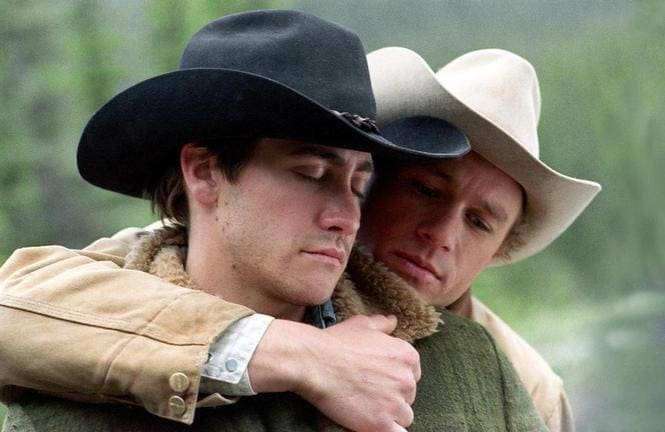Beyond The Mountains – Why Brokeback Still Matters

When Brokeback Mountain was released in 2005, it marked a watershed moment in both mainstream cinema and LGBTQ+ cultural history. Directed by Ang Lee and starring Heath Ledger and Jake Gyllenhaal, the film offered a tender, painful, and honest depiction of love between two men—set against the majestic, unforgiving backdrop of the American West. Nearly 20 years later, Brokeback Mountain still resonates deeply, not only as a love story but also as a symbol of resilience and visibility for the gay community, including bears and admirers of all generations.
Table of Contents
Plot Summary: Forbidden Love under an Open Sky
Brokeback Mountain tells the story of Ennis Del Mar (Heath Ledger) and Jack Twist (Jake Gyllenhaal), two young cowboys hired to herd sheep through rural Wyoming in the 1960s. Amidst social isolation and the beauty of nature, an unexpected passion develops between them. Forced to keep their relationship secret due to overwhelming societal homophobia, their love becomes a haunting thread—reuniting, parting, and facing the personal consequences of denying their true selves. Over decades, we witness the complex, sometimes heartbreaking realities of loving against the odds.
The Power of Representation: Why Brokeback Was Revolutionary
At the time of its release, Brokeback Mountain broke several cinematic taboos:
- Mainstream Spotlight: It brought a gay love story into global theaters, winning three Academy Awards and receiving eight nominations.
- Masculinity Redefined: The film challenged stereotypes by centering on two rugged, masculine men—giving visibility to rural, working-class gay experiences often absent from media.
- Emotional Honesty: The subtle, raw intimacy of Ennis and Jack’s relationship left a powerful mark on LGBTQ+ audiences by portraying vulnerability, longing, and heartbreak with dignity and depth.
A Mirror for the Bear Community
While Ennis and Jack aren’t “bears” by typology, their story—two masculine men whose bond is rooted in tenderness and mutual survival—resonates strongly with bear culture, which celebrates authenticity, non-conformity, and emotional strength. The film’s portrayal of same-sex love free of polished urban stereotypes offered a broader, more inclusive path for gay masculinity on-screen.
Exploring the Film’s Themes: Love, Fear, and Silenced Desire
Universal Love—and Universal Struggle
Brokeback Mountain’s genius lies in how personal and universal its story feels:
- Love vs. Society: The film reveals the personal costs of living in a homophobic world: broken families, trauma, and decades of longing.
- Yearning and Regret: Ennis and Jack’s inability to claim happiness is deeply moving—reminding viewers of the everyday courage required to be authentic when the world is unkind.
- Isolation and Intimacy: The remote mountain setting mirrors the isolation many LGBTQ+ people feel, yet also becomes a haven for their love.
Impact Beyond Film Criticism
Brokeback Mountain is not just a film—it’s a rallying cry for acceptance, urging viewers to examine social prejudices, family pressures, and the quiet acts of heroism that happen every day in the lives of queer people.
The Legacy: What Did Brokeback Mountain Change?
- Changing Attitudes: The film helped mainstream audiences empathize with same-sex love, opening the door for more LGBTQ+ stories in movies and TV.
- Inspired Connections: Many viewers, especially those in rural or conservative areas, saw their own struggles and dreams reflected in Ennis and Jack’s journey.
- Cultural References: Phrases like “I can’t quit you” became iconic, symbolizing the pain and persistence of forbidden love.
Recognition in Bear & LGBTQ+ Subcultures
- Visibility for Rural Gays: Brokeback gave voice to the struggles of those outside urban gay districts—cowboys, working-class men, and anyone forced to hide.
- Body Diversity: While not focused on typical bear imagery, the film’s celebration of “non-Hollywood” masculinity and authentic emotion resonated far beyond thin, mainstream types.
- Discussion Starter: Brokeback Mountain became a flashpoint for conversations about internalized homophobia, coming out, and the costs of denial—subjects central to bear and broader queer experiences.
Brokeback Mountain and Queer Cinema: Opening the Door
The film paved the way for a new era in queer representation, helping films like Call Me By Your Name, Moonlight, and God’s Own Country reach wider audiences. It also encouraged more honest depictions of gay relationships, from joyous to heartbreaking, in film, television, and literature.
Community Reflections: Why Brokeback Still Moves Us
For many, Brokeback Mountain is more than a movie; it’s an emotional touchstone. The pain of Jack and Ennis’ separation, the joy of their connection, and the regret of what society tried to erase echo with anyone—bear, cub, or queer person—who’s ever felt “othered” or forced to choose between adaptation and authenticity.
BearWWW members say:
- “It was the first time I saw rural men like me fall in love.”
- “Brokeback Mountain gave me the courage to be open about who I am.”
- “It’s a movie that still makes me cry—and reminds me that my story matters.”
Conclusion: The Enduring Importance of Brokeback Mountain
Brokeback Mountain remains a touchstone for LGBTQ+ representation, showing that love is as vast and complex as the Wyoming landscapes it so beautifully portrayed. Its message—to live, love, and be true, even under impossible circumstances—still moves hearts worldwide and continues to inspire generations to claim their stories, identities, and joy.
Whether you’re a bear, an ally, or anyone longing for representation, Brokeback Mountain is a testament to the enduring strength and beauty of queer love.